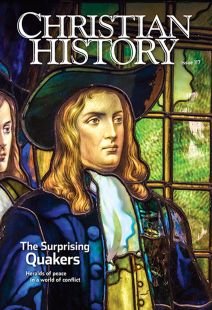Quakers, Did you know?
Doing business with Friends
The nineteenth century saw many Quakers rise to prominence in business. Quaker businessmen owned three famed British chocolate companies: Cadburys, Frys, and Rowntrees (for more, see “Godless capitalists?” in CH 104). None of the three firms remains Quaker today. Barclays Bank, the closest thing Quakers had to a national bank for their movement, goes all the way back to Quaker goldsmiths John Freame and Thomas Gould in 1690. Freame’s grandson David Barclay, a strong abolitionist and supporter of William Wilberforce, spent over £3,000 of his own money to free and transport to Philadelphia the slaves on a Jamaican plantation he received to settle a debt. Western Union was founded as a telegram-sending company by Quaker educator and politician Ezra Cornell, who also cofounded Cornell University. The company passed out of Quaker hands in 1881 and in 2006 discontinued the telegram service that had made it a communications empire.
But some famous products with the name “Quaker” aren’t Quaker at all. The founders of Quaker Oats learned about Quakerism by reading an encyclopedia article in 1877. Quaker State Motor Oil also has no connection to Quakers, other than being named for Pennsylvania, the state William Penn founded. In fact dozens of commercial products, ranging from rugs to hosiery to bathtubs to whiskey to chamber pots, were branded with Quaker labels because marketers and consumers associated “Quaker” with “Quality.”
Order Christian History #117: The Surprising Quakers in print.
Subscribe now to get future print issues in your mailbox (donation requested but not required).
Fire and brimstone on his head
Early Quakers would not take up arms, but that didn’t stop them from taking off their clothes. One of the most unusual things early Friends did to confront the ills of British society was to “go naked as a sign.” Like the prophets of the Old Testament, they felt they were called to do strange things to preach God’s message.
George Fox encouraged going naked to point out the folly of earthly wealth and success in 1652. In 1654 William Simpson wrote that he passed through Oxford naked, “signifying … that the Day was near at Hand … in which the Lord would strip you naked and bare” from both the English government and its state church. And famed diary-keeper Samuel Pepys noted that one day in 1667 at Westminster Hall “[Solomon Eccles], a Quaker, came naked through the Hall, only very civilly tied about the privities to avoid scandal and with a chafing-dish of fire and brimstone upon his head … crying ‘Repent! Repent!’”
No more chewing chewing gum
The Quaker practice of not speaking in worship prompted generations of parents to begin the “quiet game” to see how long children could go without making a noise: “Quaker meeting has begun. / No more laughing, no more fun” (or “No more chewing chewing gum”). It’s certainly not the only time Quakers appear in poetry: Lord Byron wrote to one of the many women he fell in love with at first sight, this one a Quaker, these words:
… Let me breathe this parting prayer,
The dictate of my bosom’s care:
“May heaven so guard my lovely quaker,
That anguish never can o’ertake her;
That peace and virtue ne’er forsake her,
But bliss be aye her heart’s partaker!”
Quakers have come up with rhymes (sometimes at their own expense) as well. Simon Heywood of the Sheffield Meeting in Britain penned this classic:
I’m a lonely little Quaker
and I’m feeling very small.
I’m the clerk of Monthly Meeting
and there’s no-one here at all.
I’ve got all the minutes drafted
and I’m ready with my pen
but the sense of Monthly Meeting
is they’ve stayed at home again. . . .
If it wasn’t for the Quakers
in the Quaker burial ground
then I’d be the only Quaker
for a hundred miles around.… CH
This article is from Christian History magazine #117 The Surprising Quakers. Read it in context here!
By the editors
[Christian History originally published this article in Christian History Issue #117 in 2016]
Next articles
Editor's note: Quakers
Jennifer Woodruff TaitSeeking the light of Christ
George Fox and Margaret Fell formed their movement in a turbulent era of church history
Max L. CarterA woman with a message
Margaret Fell insisted she and other women had the right to preach
Margaret FellSupport us
Christian History Institute (CHI) is a non-profit Pennsylvania corporation founded in 1982. Your donations support the continuation of this ministry
Donate




